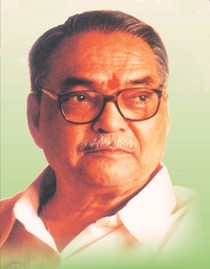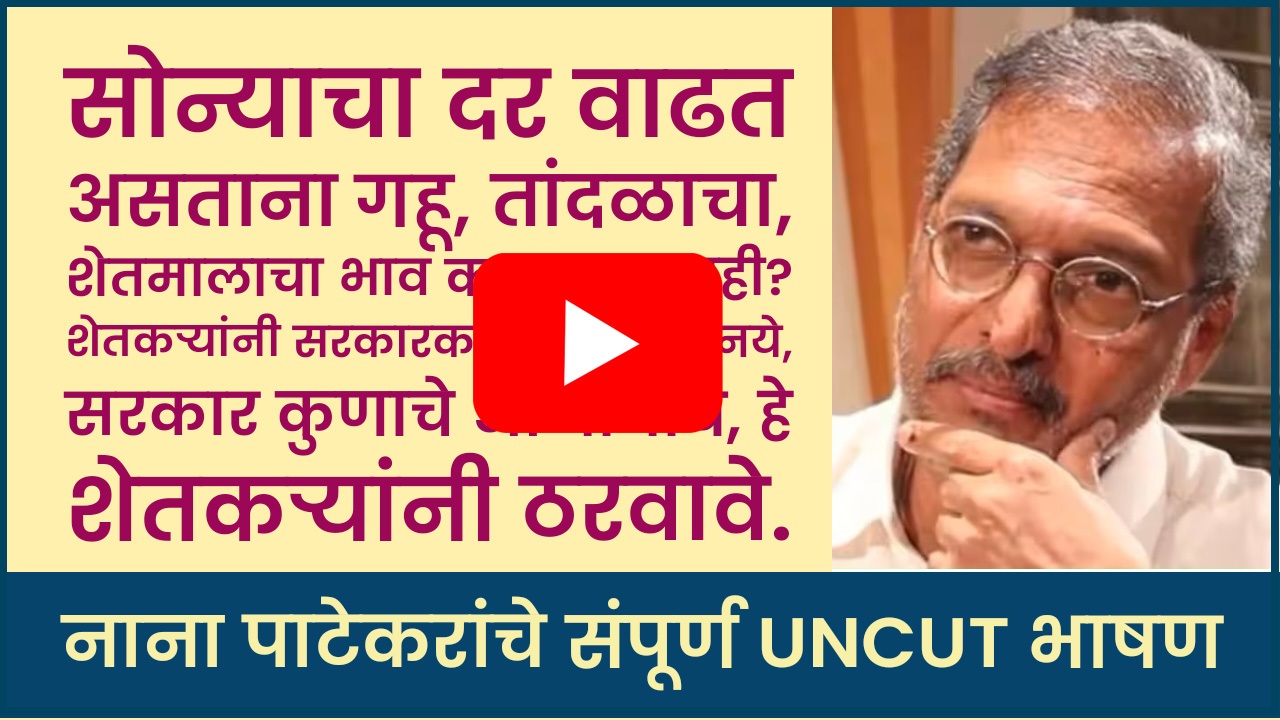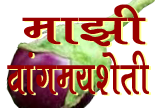
 नमस्कार ! नमस्कार !  बळीराजावर आपले स्वागत आहे. |
बळीराजा डॉट कॉमवर वाचा
आजचे बाजारभाव
आजचे बाजारभाव पाहण्यासाठी https://www.baliraja.com/node/3024 या लिंकवर क्लिक करा.
What went wrong with Independence? - Sharad Joshi - Chapter 1
लेख
WHAT WENT WRONG WITH INDEPENDENCE? -1
.
.
.
.
It is now 50 years since British rule in India officially came to an end on August 15, 1947. This year is being celebrated throughout the country as the golden jubilee of India's independence .
After so many years of slavery the dawn of freedom came to India and the country awoke from centuries of slumber; we became the masters of our destiny. The general sentiment was that with the transfer of power the problems of poverty, hunger, disease, illiteracy, superstition, communalism and casteism, afflicting the country for centuries, would soon be resolved. If any citizen in 1947 had been asked what the situation in the country would be in 1997, that is 50 years after independence, he would have said with full self-confidence, "Independent India will have climbed to the pinnacle of the world's nations in fifty years." In a moving speech made in the central hall of the old council Pandit Jawaharlal Nehru said, "The country awakes after long slumber and struggle, vital, free and independent....We have a tryst with destiny." A popular song often recited during the struggle for independence reflects even more admirably the expectations of the people of India: "We will not stop until we have the world in our hands."
Ominous forebodings
Even then, there were not a few Indians who struck a jarring note. "Ah, only British know how to rule. What kind government can these Nehrus and Patels run? Chaos and anarchy will make a mess of the country." Such forebodings were given scant regard as coming from the Rao Sahebs, Rao Bahadurs, government pensioners and others living off the largess of the Raj and unhappy at the departure of the British.
The British prime minister during the war years, Winston Churchill, was opposed to giving freedom to the colonies of the empire. "I have not become the Prime Minister of the Emperor in order to preside over the liquidation of the British Empire" was his proclamation. He argued that most colonies did not know civilisation before the advent of the empire. It was the law of the jungle, big fish eating the small. Social fissures, untouchability, child marriage, immolation of widows and such primitive practices were rampant in India before the British came. Churchill was convinced that the British empire had come as a blessing to the millions of helpless, poverty-stricken people of the colonies. The common man was happy under British rule and had no particular craving for freedom; those leading the freedom movement were a coterie of mediocre people spreading disaffection and violence in pursuit of power and selfish interests. If the power were transferred to them, they would ruin the lives of the poor and the weak, provoke communal conflict and cause bloodshed. Have mercy on the Indian people and do not wind up the Empire. This is what Churchill stood for.
Independence by Accident
Hitler was defeated in the World War II, and the Japanese forces that were knocking at India's door capitulated. The war effort exhausted the British people. The British Empire on which the sun never set could be maintained no longer. In countries like India discontent was spreading in armed forces as well. Sailors in the navy even rose in revolt. It was clear that to continue to rule over India under such conditions would require the extreme efforts of a world war. It was also clear that the price would have to be paid not only in money and materials but also in blood. A few thousand Britishers had ruled India for a century and a half by using local officials and a local army; this was no longer possible. Now the natives were estranged. Even if all the people of England were mobilised and deployed from Delhi to the villages, it would still not be possible to keep the empire. Even to maintain it for a short time would involve a terrible cost in blood, sweat and tears and if such a struggle took place it would be impossible for Britain to maintain its status as champions of liberty in the comity of nations. In such a situation, granting independence to the colonies and, particularly, to India was inevitable. The lion, wounded in the world war, could not keep under its control a people awakened by the Mahatma. In the midst of the fanfare and cacophony of the celebration of independence, few paid any attention to the forebodings expressed in India or to the inauspicious warnings of Churchill.
Forebodings come true?
Fifty years have passed since the end of British rule. The tryst with destiny has never truly occurred. The dreams of becoming the pinnacle of the world community have been shattered. The dilemma of poverty persists, the numbers of illiterate have risen, inflation and unemployment continue to cause havoc; bureaucrats, black marketeers, thieves and criminals have come to dominate; the goondas have mainpulated the political leaders and then displaced them. Thanks to the progress of science and technology abroad, the country has, at least, been able to produce enough grain to feed itself. Due to the near eradication of infectious diseases such as smallpox, plague, cholera and malaria, life expectancy has risen. Undoubtedly, industries have grown in large cities, but it cannot be said that if the British had stayed such industries would not have grown. Compared to the rest of the world India has not progressed after independence; on the contrary, it has deteriorated. Countries like Indonesia, Malaysia and Thailand, which were more backward than India fifty years ago, have gone many times farther ahead.
It is unnecessary to marshal comprehensive statistics to establish the relative decline of India after independence. When independence came, the per capita income was less than Rs 250; now it stands at around Rs 12,000. The present rupee is barely worth 3 paise of the 1947 one. The per capita income in terms of prices prevailing 50 years back increased from Rs 250 to Rs 400. In terms of Purchasing Power Parity (PPP), which United Nations’ economists use to compare incomes of different countries in terms of their actual purchasing power, the income of an Indian citizen was US $1348 in 1995. Bangladesh with $1331 is a little behind. Pakistan at $2154 is significantly ahead - by almost 60%. China ($2604), Sri Lanka ($2377), Thailand ($7104), Malaysia ($8865), Korea ($10,656) and Singapore ($20,987) were all behind India 50 years ago, but have made rapid strides forward. The countries that were defeated and devastated in the war have reconstructed and made dazzling progress. Japan now has a per capita income of $21,581, Germany $19,675 and Italy $19,365.
Silver lining in the dark clouds
It is not that there has been no progress. Life expectancy has practically doubled. At independence, the country was in the jaws of famine; it has since become self-sufficient in foodgrains. With the exception of Pakistan-occupied Kashmir and some thousands square kilometers of area on the northeast frontier, the Indian republic has continued to hold sovereignty over all areas transferred to it by the British. Elections are held regularly; the army has not even attempted a coup to establish a military dictatorship. Except for a brief period when Indira Gandhi clamped down her Emergency, parliamentary democracy continues to function. Quite a few other instances of advancement since independence can be cited. Schools, however ill-equipped and ill-staffed, have been opened in most villages; the proportion of illiterates has diminished and the facilities and opportunities for higher education in urban areas have multiplied. But it is also true that the absolute number of illiterates has risen. Roads have been built to connect villages, State-run buses ply them and postal services connect most settlements. At the same time, poverty in rural areas is not significantly diminished. Hundreds of thousands of rural refugees continue to migrate to cities like Mumbai and Delhi in search of livelihood, and the cities have swollen beyond all proportion; even district towns are expanding at a galloping rate. At independence, the rural poor who moved to the cities lived in tin hutments and cement tenements. Now they settle down in slums and on footpaths. Briefly, the history of the last fifty years is far from being a proud chronicle of success.
India, as a newly independent country, followed the path of socialism under the leadership of Pandit Nehru. Socialism and its institutions have since met a world-historic defeat. There has been some talk of liberalisation; but it was short lived. No one on the scene appears to be tall enough to guide the nation. In its 50th anniversary of independence, the nation is standing on the edge of a precipice and its people are more confused than at any time in their long history.
- Sharad Joshi
--------------------------------------------------------------------------------------------------------------------------------------------------------
1) What went wrong with Independence? - Sharad Joshi - Chapter - 2

- आपली प्रतिक्रिया लिहिण्यासाठी Log in (प्रवेश करा) किंवा register (नवीन खाते बनवा)
- 3421 वाचने




 एकूण भेटी
एकूण भेटी




